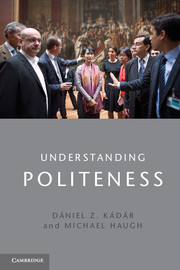Book contents
- Frontmatter
- Contents
- List of figures
- List of tables
- Foreword
- Acknowledgements
- 1 Introduction
- Part I Theoretical framework
- 2 The roots of politeness research
- 3 Recent developments in politeness research
- 4 Politeness as social practice
- 5 Understandings of politeness
- Part II Politeness and time
- Part III Politeness and social space: from mind to society
- Notes
- Glossary
- References
- Index
2 - The roots of politeness research
Published online by Cambridge University Press: 05 June 2014
- Frontmatter
- Contents
- List of figures
- List of tables
- Foreword
- Acknowledgements
- 1 Introduction
- Part I Theoretical framework
- 2 The roots of politeness research
- 3 Recent developments in politeness research
- 4 Politeness as social practice
- 5 Understandings of politeness
- Part II Politeness and time
- Part III Politeness and social space: from mind to society
- Notes
- Glossary
- References
- Index
Summary
Introduction
Like many other scholarly fields with a history, politeness research can be metaphorically described as a tree. Current theories of politeness have been influenced by earlier models which benchmarked the birth of the field. Indeed, earlier models continue to have an influence on the way in which politeness is described and studied, either directly, as some of these models continue to be used by researchers, or indirectly, as many of the approaches that have been subsequently developed clearly position themselves as counter or alternatives to these early theories. Using the tree analogy, earlier models of politeness are akin to the roots: they provide the fundamental starting point for understanding the field. In this chapter we will refer to these early models, following Jonathan Culpeper (2011b), as first-wave approaches. However, rather than reviewing the entire history of their development and reception in the field, we will concentrate on highlighting the key theoretical and methodological assumptions underlying these first-wave approaches.
In general, the first-wave approaches aimed to model politeness on a somewhat abstract, theoretical level. This reflects the way in which scientists usually approach hitherto unknown realms: they tend to rely on theoretical models, even though they maintain that the model is an abstraction of reality, and not the reality itself. Accordingly, it is an implicit assumption in all first-wave approaches that linguistic politeness can and should be modelled in abstract terms. While these various approaches differ in their detail, they all build on the seminal work of the language philosopher Herbert Paul Grice (1989[1975]) on pragmatic meaning, in particular, the so-called Cooperative Principle (CP), as the underlying conceptual basis of the models proposed.
- Type
- Chapter
- Information
- Understanding Politeness , pp. 13 - 35Publisher: Cambridge University PressPrint publication year: 2013



